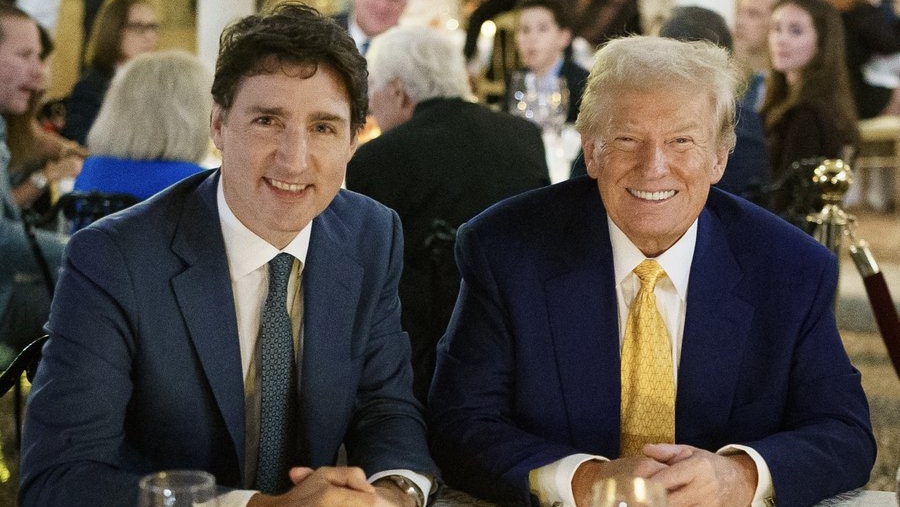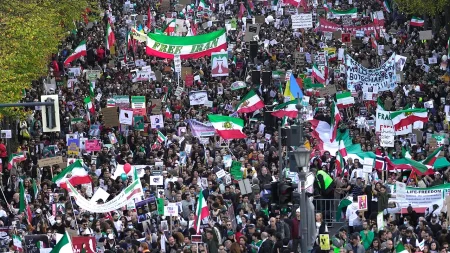Donald Trump’s resurgence onto the political stage has been marked by a revival of unorthodox policy proposals, one of the most striking being his repeated suggestion that Canada should become the 51st state of the United States. This proposition, seemingly outlandish on its face, has been interwoven with criticisms of Canadian Prime Minister Justin Trudeau’s leadership and trade policies, culminating in a statement issued by Trump on Truth Social following Trudeau’s announcement of his resignation. Trump linked Trudeau’s decision to his purported awareness of the “massive Trade Deficits and Subsidies that Canada needs to stay afloat,” implying a direct causation between his own trade pressures and Trudeau’s departure from office. Trump further embellished his vision of a US-Canadian merger, painting a picture of eliminated tariffs, reduced taxes, and enhanced national security against perceived threats from Russia and China.
Trump’s advocacy for a US-Canadian union is not a new phenomenon. Reports suggest he broached the topic directly with Trudeau during a meeting at Mar-a-Lago in late November. This meeting, which occurred just weeks before Trudeau’s resignation announcement, followed threats from Trump to impose significant tariffs on Canadian products, particularly in response to what he perceived as Canada’s insufficient efforts to curb illegal immigration and drug trafficking into the United States. Trump framed the meeting as an opportunity to discuss critical bilateral issues, including the fentanyl crisis, trade imbalances, and the need for fairer trade deals that protected American workers. The juxtaposition of these discussions with Trudeau’s subsequent resignation fueled speculation about the potential influence of Trump’s pronouncements and policy positions on the Canadian political landscape.
The timing of Trump’s renewed call for Canadian statehood, coinciding with Trudeau’s resignation announcement, amplified the perceived connection between the two events, at least in Trump’s narrative. He portrayed Trudeau’s decision as an acknowledgment of the inherent economic weaknesses of Canada and the supposed inevitability of closer integration with the United States. Trump’s pronouncements, disseminated via his Truth Social platform, have resonated with his base and sparked renewed debate about the future of US-Canadian relations, even as they have been met with skepticism and outright dismissal from many within both countries.
Justin Trudeau’s resignation as Prime Minister and leader of the Liberal Party marked the culmination of months of political pressure and declining approval ratings. While he cited the need to avoid internal party struggles and offer Canadians a clear choice in the next election, the backdrop of economic challenges, including rising inflation and cost of living pressures, contributed significantly to his diminishing popularity. The abrupt departure of Finance Minister Chrystia Freeland, whose resignation letter reportedly criticized Trudeau’s economic policies and alluded to the pressures exerted by Trump’s trade threats, further destabilized his position.
Trudeau’s nearly decade-long tenure as Prime Minister was marked by a complex relationship with the United States, particularly during the Trump presidency. The two leaders clashed on trade issues, with Trump repeatedly accusing Canada of unfair trade practices and threatening punitive tariffs. While officially maintaining a diplomatic stance, Trudeau faced increasing criticism at home for his handling of these trade disputes and the perceived economic vulnerability of Canada in the face of American pressure.
While various factors contributed to Trudeau’s eventual resignation, the timing and context of Trump’s pronouncements on Canadian statehood and trade imbalances have undeniably added another layer of complexity to the narrative. Trump’s public statements have served to amplify his own role in the unfolding events, further solidifying his image as a disruptive force in international relations and reinforcing his focus on trade and economic nationalism. Regardless of the actual impact of Trump’s rhetoric on Trudeau’s decision, the intersection of these events has undoubtedly heightened scrutiny of the future of US-Canadian relations and the potential ramifications of a renewed Trump presidency.















